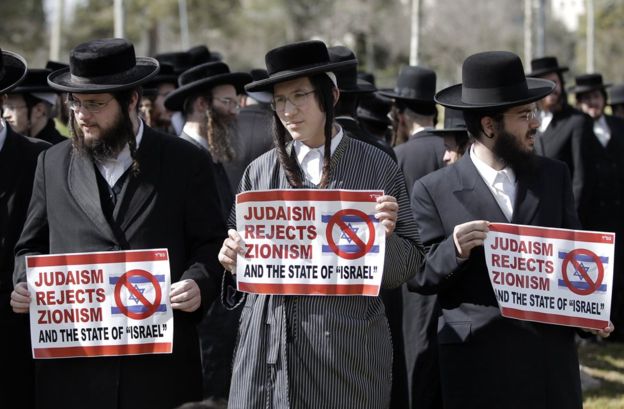What’s the difference between anti-Semitism and anti-Zionism?
BBC
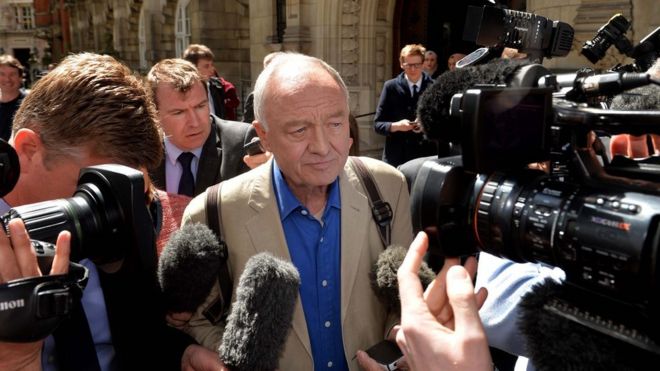 Image copyright: Getty Images
Image copyright: Getty ImagesThe UK Labour Party has been at the centre of a row over anti-Semitism, including its relationship to anti-Zionism. What do these terms actually mean?
- Anti-Semitism is “hostility and prejudice directed against Jewish people” (OED).
- Zionism refers to the movement to create a Jewish state in the Middle East, corresponding to the historic land of Israel – anti-Zionism opposes that.
- But some say “Zionist” can be used as a coded attack on Jews, while others say the Israeli government and its supporters are deliberately confusing anti-Zionism with anti-Semitism to avoid criticism.
Former London Mayor Ken Livingstone was suspended from Labour following a series of remarks about Israel, including the suggestion that Hitler supported Zionism before the Holocaust.
It follows the suspension of Bradford West MP Naz Shah after it emerged she had once suggested, among other things, that Israel should be moved to the United States. The new president of the National Union of Students, Malia Bouattia, has also been heavily criticised for remarks she made about Zionists.
Many in the Jewish community say the use of “Zionist” as a term of abuse reflects a rising tide of bigotry and racism directed at Jews.
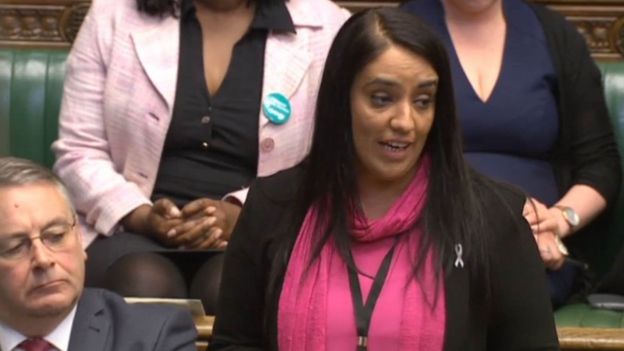 Image copyright: PA
Image copyright: PAImage caption: Suspended Labour MP Naz Shah
_
The Labour peer Lord Levy told the BBC’s Newsnight: “There can be criticism of the state of Israel, but anti-Semitism – using the word ‘Zionist’ as another form of anti-Semitism – frankly can no longer be tolerated.”
Others – including Livingstone – argue anti-Zionism is not the same as anti-Semitism, and that it’s wrong to mix up anti-Jewish prejudice with legitimate disagreement with the actions of the Israeli state.
However, critics of anti-Zionists point out that sometimes particularly harsh criticism of Israel goes further than disagreement with policies, but rather denies the right of the Jewish state to exist.
Speaking on The Daily Politics, the former London Mayor said: “Don’t confuse anti-Semitism with criticism of the Israeli government policy and treatment of the Palestinians.”
It’s a debate around which emotions run high. It’s also obviously true that being a Zionist and being Jewish are not the same thing.
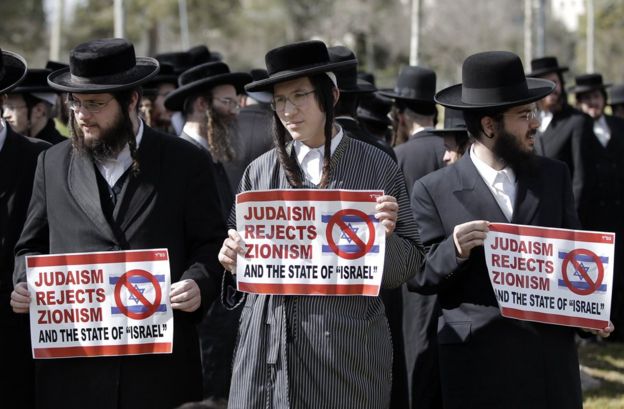 Image copyright: Getty Images
Image copyright: Getty ImagesImage caption: Neturei Karta believes the true Jewish state will be established with the coming of the Messiah
There are Zionist critics of Israeli government policies, such as the occupation of the West Bank, the route of the separation barrier (which Israel is building in and around the West Bank and which it says is for security against Palestinian attackers, though Palestinian supporters see it as a device to grab land) and the building of settlements.
Equally, there was Jewish opposition to the Zionist movement, which sought to establish a Jewish homeland, long before the state of Israel was declared in 1948. Today fringe ultra-Orthodox groups such as Neturei Karta oppose the state of Israel because they believe the true Jewish state will only be established with the coming of the Messiah.
Likewise, some make the point that Zionism is a political project supported by plenty of non-Jews, including Western governments and many US evangelical Christians.
But it’s been widely argued that the term “Zionist” has, in some circles, become a code word for “Jew” and that bigotry against Jewish people has been expressed using the language of anti-Zionism.
What is Zionism?
- Political movement which emerged in 19th Century Europe aimed at countering anti-Semitism, and establishing a Jewish homeland
- In the Hebrew Bible the word “Zion” refers to Jerusalem, hence the movement’s identification with the city and the land that surrounds it
- Balfour Declaration of 1917 gave British support to the establishment of a Jewish national home in Palestine
- Chaim Weizmann, the president of the Zionist Organisation, was elected the first president of Israel in 1949
Khadim Hussain, a former Lord Mayor of Bradford, was suspended from Labour after he shared a Facebook post that referred to “the six million Zionists that were killed by Hitler”. Alex Chalmers, a former co-chair of Oxford University Labour Club,said some members regularly used the word “zio” – despite it being regarded as an ethnic slur.
Bouattia was attacked after it emerged that in 2011, she co-wrote a blog for a Friends of Palestine campaign group saying that “the University of Birmingham is something of a Zionist outpost in British Higher Education”. She has also attacked “Zionist-led media outlets” – which critics said reflects anti-Semitic myths about Jewish conspiracies to control the media.
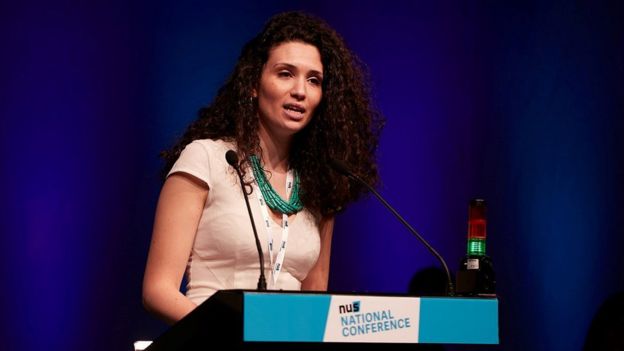 Image copyright: PA
Image copyright: PAImage caption: Malia Bouattia, new head of the NUS
–
On the other hand, it’s regularly claimed that accusations of anti-Semitism are deployed to silence criticism of the Israeli government or to further other political ends.
Pia Feig, of Manchester Jews for Justice for Palestinians, told BBC Radio 2’s Jeremy Vine programme that “anti-Semitism has been used to quieten down and suppress my concern and the concern of other people for Palestinians”.
In a statement after Livingstone’s suspension, the Jewish Socialists’ Group saidaccusations of anti-Semitism were being “weaponised” to attack the leadership of Jeremy Corbyn.
On the other hand, supporters of Israel ask why it’s the Jewish state that is so widely singled out for criticism and not Iran, Russia, China or any other state attacked for their human rights record.
Baroness Julia Neuberger told the BBC’s Jeremy Vine show that anti-Zionism implies “Jews have no right to self-determination, unlike other people”. Mark Wallace, writing for Conservative Home, said in practice it would mean either allowing Israel to be wiped out by its enemies or “denying millions of Israeli Jews their home and deporting them”.
Some anti-Zionists say Zionism itself is a racist ideology, because of how, in their view, the Palestinian people have been treated by the Israeli state. The Palestine Solidarity Campaign says it opposes all racism, including anti-Jewish prejudice and the “the apartheid and Zionist nature of the Israeli state” – although the PSC has itself been accused of racism for its anti-Zionist stance.
Bouattia said she rejected claims of prejudice, adding that “for me to take issue with Zionist politics is not me taking issue with being Jewish” and that “Zionist politics are held by people from a variety of different faiths, as are anti-Zionist politics”.
Accusations of anti-Semitism continue to dog Labour. Vicki Kirby was forced to stand down as a parliamentary candidate after tweeting that Hitler was a “Zionist God”. She was re-instated and then suspended again. Gerry Downing, who was expelled from the party, described “Zionist politicians within the ruling classes of America and Europe”.
Livingstone was accused of “rewriting history” over his remarks about Hitler supporting Zionism by Labour MP John Mann, chair of the All-Party Parliamentary Group against Anti-Semitism.
Few would deny there are anti-Semites who call themselves anti-Zionists, or that it’s possible to criticise Israel without being a racist or a bigot. But agreement on how exactly the two relate appears elusive.
